
archives for 02/2016
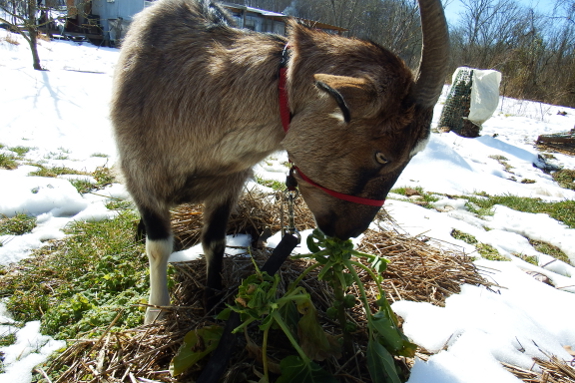
Around the beginning of
January, goat greenery seemed to screech to a halt. Our does had been
gorging on honeysuckle and oat leaves since September, but pickings were
finally getting slim. Don't get me wrong --- none of the plants were
completely wiped out. But Abigail told me the juice wasn't worth the
squeeze.
When the herd queen
speaks, I listen. So I changed gears, cutting the fresh greenery out of
their daily diet and replacing it with an afternoon feeding of butternut squash, carrots, apples, and clementine peels instead. Since I missed spending time with the herd, I also took them out in the woods for walks
a couple of times a week, but there wasn't really much for our girls to
eat out there. Instead, they were reduced to living on their daily
rations plus an unlimited supply of hay.
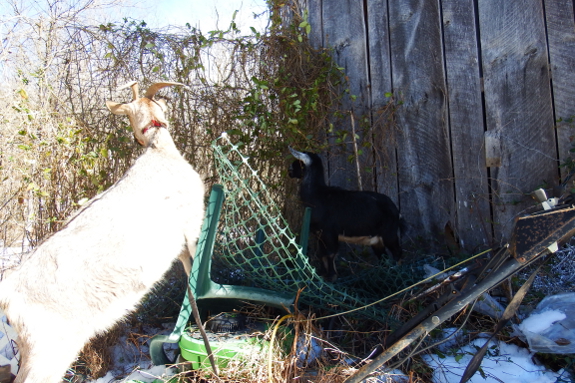
Fast forward ahead nearly
a month, and suddenly those slim pickings seemed worth eating once
again! Mark would be horrified by this shot of the clutter beside our
barn, but the debris did its job well --- it prevented me from grazing
our herd on a lone patch of honeysuckle, saving those leaves for a
midwinter treat. Meanwhile, I let the girls have a couple of brussels
sprouts plants that had seen better days, and I'm hoping that once the
snow melts later in the week our goats might be willing to munch on low
oat leaves once again as well.
Good thing too --- we've
finally run out of homegrown goat carrots and the butternut stores are
even getting a little bit low. Friday night, I dreamed of tall grass,
rich and ready for our goats to browse. I love the restful season of
winter, but I'm beginning to anticipate the bounty of spring.
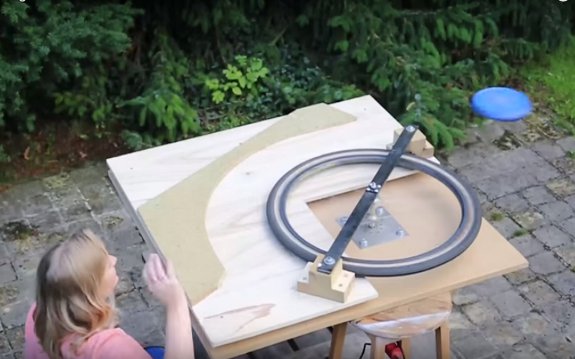
I saw this fun, long range frisbee launcher and thought that a biodegradable frisbee could hold seeds and spin them out during its rather long flight.
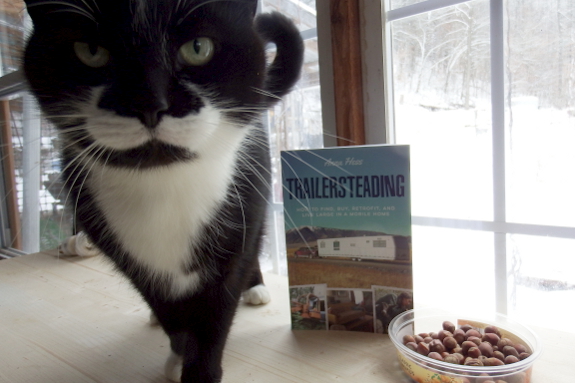
The print edition of Trailersteading is now live! You can read our cats' half-hearted endorsements here or check out what human readers have to say here.
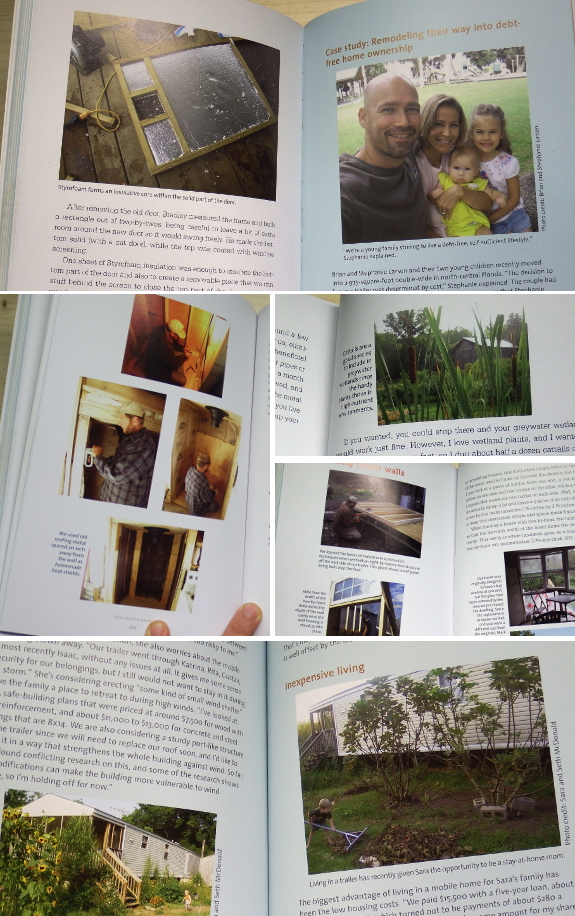 Feline
back-stabbing aside, I've been amazed at how well received this book
has been. After all, I originally envisioned it as a bit of a joke. Why
would anyone want to learn about our choice to homestead in a dirt-cheap
mobile home when they could dream about strawbale houses or cob
domiciles?
Feline
back-stabbing aside, I've been amazed at how well received this book
has been. After all, I originally envisioned it as a bit of a joke. Why
would anyone want to learn about our choice to homestead in a dirt-cheap
mobile home when they could dream about strawbale houses or cob
domiciles?
What I didn't expect was
the 150+ five-star reviews from homesteaders just like me who were
itching
for a less expensive and time-consuming alternative to the traditional
path of home ownership. Readers called the book "new and exciting," "a
groundbreaking literary effort," and "very informative," while several
mentioned that Trailersteading had inspired them to retire
early by embracing life within an old mobile home.
Want to see what all the fuss is about? Trailersteading should
now be available at your local bookstore or library --- if not, just
ask them to order a copy. And the book is also up for purchase on your
favorite online retailers, whether that's Amazon, Barnes & Noble, or someplace else.
I hope you enjoy the read and a huge thank-you to everyone who has
already given it a shot! Your early purchases and reviews help my books
get out of the gate and ensure that Mark and I can continue to spend our
time regaling you with our hopes, failures, and successes from the
tranquility of our permaculture trailerstead. Thank you for helping to
make our dreams a reality.
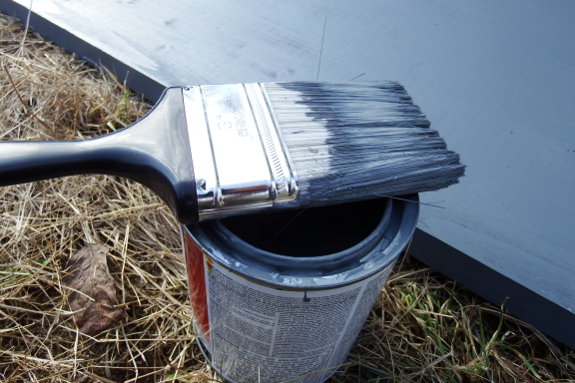
We're taking full advantage of this dose of midwinter sun and warmth. Monday, we managed to get the creek pump
going despite icy ground, filling the wash-water tank before it drained
completely dry. Tuesday, I caught up on a bit of laundry while the sun
was shining, 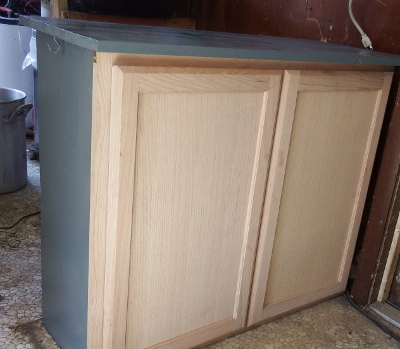 then pulled out the paint can and brush to coat some of our kitchen remodeling projects.
then pulled out the paint can and brush to coat some of our kitchen remodeling projects.
Mark chose this dark
blue/gray based on the reality of our housekeeping skills. We'd
originally considered just staining the boards since we both love the
warm tones of plain wood. But our cats have free rein of the kitchen and
like to leave dirty footprints everywhere. We wipe up after them now
and then, but figured it might be smarter to just start with a darker
color to begin with so those paw stains aren't so obvious.
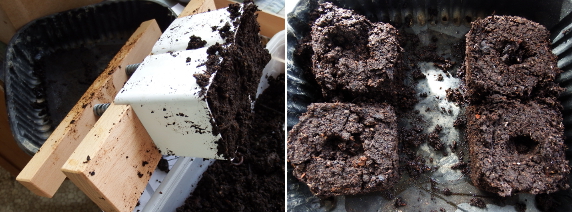
Pure stump dirt cubes didn't hold together very well. But half-and-half stump dirt/potting soil cubes did much better.
We'll keep you posted about how well the herb seedlings fare once they germinate and start to grow.
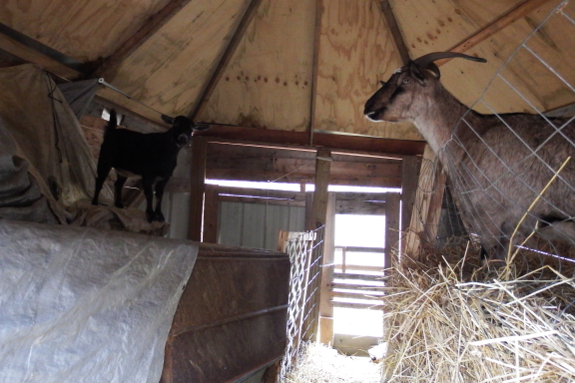
"Oh, Abigail, why do you
have to be so bad!" I exclaimed when I entered the goat shed Monday
morning. I'm used to Artemesia jumping over into the kidding stall and
then onto the tarp-covered pile of stored hay therein. But Abigail used
to stay put in the main room where both goats belong.
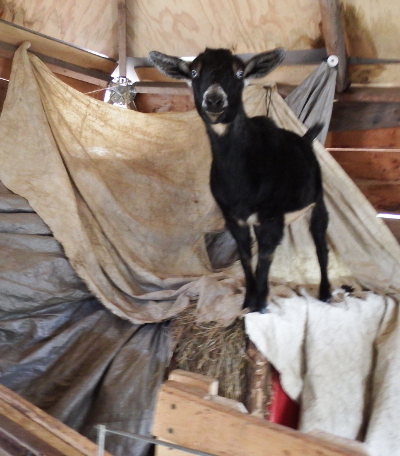
No longer. Our herd queen bent down the top of our wire manger
then figured out how to leap from milking stanchion to a new perch atop
the hay. Next, she proceeded to sleep there and poop there, meaning the
loose hay was no longer on her goat-approved menu.
In her defense,
though, I think Abigail was just trying to force my hand since I'd kept
adding new hay on top of old hay that she wasn't entirely keen on. So I
cleaned out the whole manger and put a much smaller layer of fresh hay
back in. Hopefully that will be enough to make our herd queen obey the
rules...although I have no hope that our little leaping charmer will
keep her feet planted firmly on the ground.
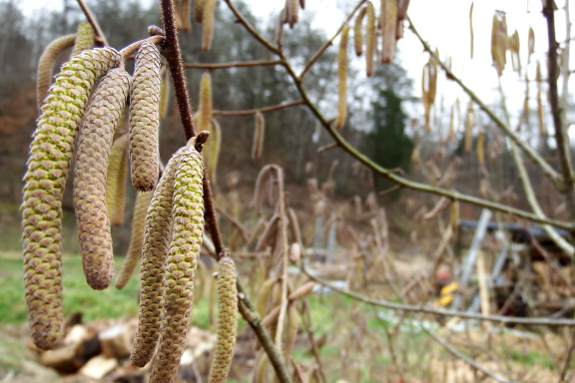
The first cultivated bloom of the year for us is always the hazel bushes. From a bee standpoint, it's nearly time to look for pollen when you see the catkins begin to loosen and 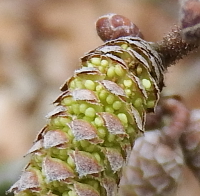 yellow, meaning that stamens will soon emerge.
yellow, meaning that stamens will soon emerge.
I don't think the bush
really counts bloom time until a little later, though. The tiny female
flowers won't open up until the male flowers are in full bloom, which
probably won't be for a couple more weeks yet.
Meanwhile, for those of you keeping track in your own yards, I should mention that hazel is very different from witch hazel. The latter can bloom at any time between late fall and early spring, with the bloom time (according to Lee Reich)
depending on the number of chill hours the tree has enjoyed. Our witch
hazels bloomed quite early this winter, which I hope isn't an ominous
sign meaning our fruit trees will be similarly precipitous.
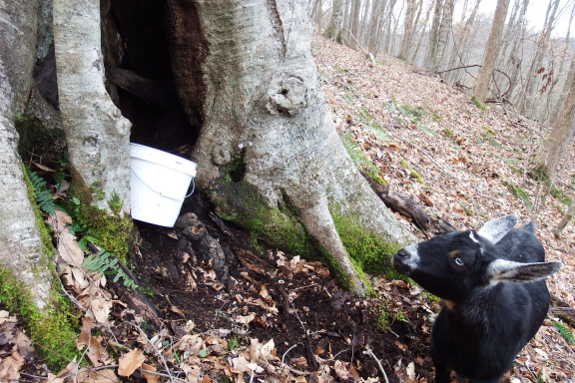
I took advantage of the warm weather to gather some stump dirt
for onion seed starting this week. The goats "helped"...which means
they poked their noses into the bucket repeatedly, completely confused
about why I would waste energy gathering something that wasn't
immediately edible.
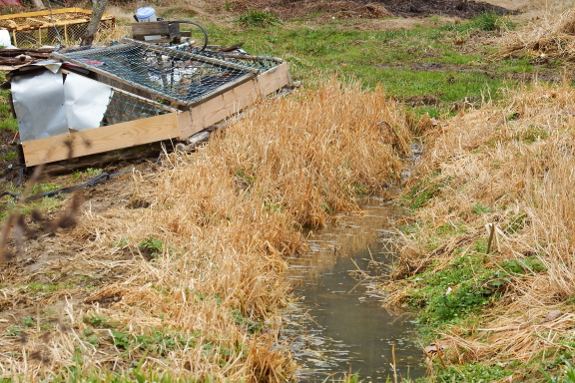
The tractored hens
also assisted with early garden preparations. Day by day, I pulled the
small flock across the downhill side of a high raised bed in the swampy
back garden so they could eat up chickweed and scratch up dead oat
stalks. This area will go under a quick hoop shortly to preheat the soil
for the earliest lettuce and peas.
My DIY
boom pole worked okay,
but it turned out to be a little too heavy.
It also created small amounts
of noise whenever I shifted my body weight.
The Rode boom pole is the perfect size
and weight but if your shock mount is 5/8 then you need to buy a 5/8
male to 3/8 female adapter.
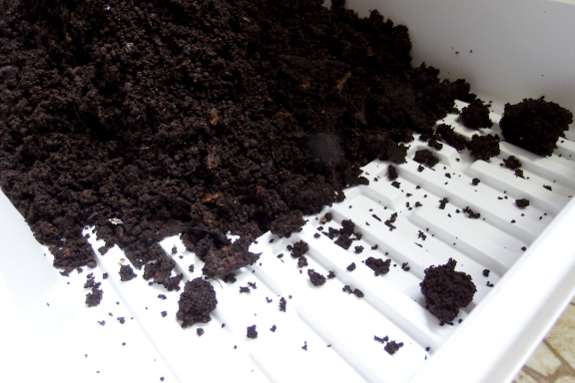
Onions are probably our
biggest vegetable-gardening Achilles heel --- we ran out in January
again this year. Wanting to be able to start these 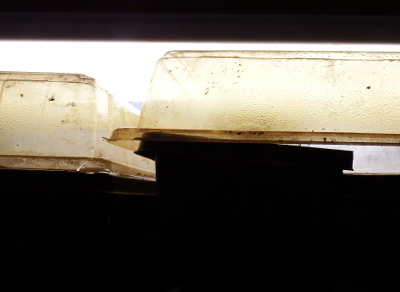 seedlings inside in February was a big part of the impetus for my spare-no-cost improved seed-starting campaign in fact.
seedlings inside in February was a big part of the impetus for my spare-no-cost improved seed-starting campaign in fact.
So it seems fitting that onions should be the first vegetables to enjoy our new flats.
The containers I've been using are literally a decade old, so all are
torn and not-quite waterproof. The new white ones are reputed to be a
little hardier, although I can tell I'll still need to be careful with
them. But maybe they'll be in a little better shape in 2026 when Mark
once again talks me into buying new gear?
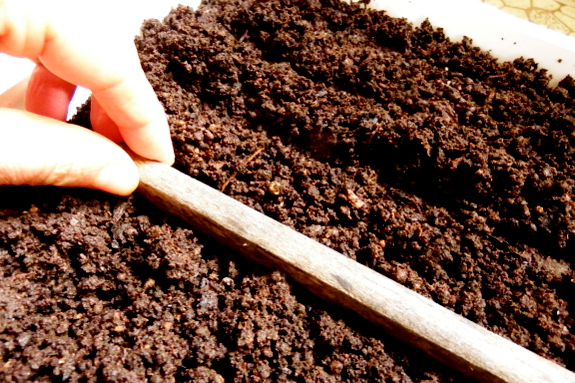
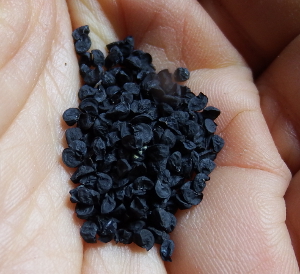 I
didn't use all new supplies, though. I found this wooden stick in
Mark's workshop (hopefully it wasn't intended for anything important)
and cut it to just the right length to make indented rows in my found stump dirt.
Then I meticulously sprinkled in the seeds, half an inch apart.
Finally, I added another thin coating of stump dirt atop each row and
pressed down gently with my palms to compact the earth.
I
didn't use all new supplies, though. I found this wooden stick in
Mark's workshop (hopefully it wasn't intended for anything important)
and cut it to just the right length to make indented rows in my found stump dirt.
Then I meticulously sprinkled in the seeds, half an inch apart.
Finally, I added another thin coating of stump dirt atop each row and
pressed down gently with my palms to compact the earth.
With potting soil,
there'd be a moistening step in there too (preferably before the soil
even hits the flats). But stump dirt comes out of the tree at the
perfect hydration level for planting seeds.
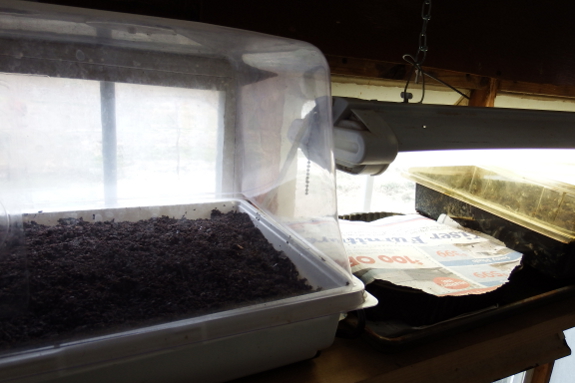
Mark growled when I took the heating pad out of Lucy's den and put it under my first set of flats. (Hey! That's why we bought the pad in the first place!) So I went ahead and splurged a little further, this time buying a heat mat that's waterproof and is just the right size and shape to fit beneath a seedling tray. My new humidity domes
hadn't arrived in the mail yet, so I popped a larger dome we use for
rooting perennial cuttings on top and called that flat complete.
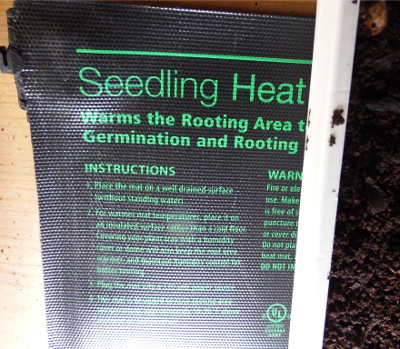 I'll
admit that these are going to be some expensive onions since we spent
nearly a hundred bucks on new seed-starting supplies. And that doesn't
even count the lights (which Mark already had on hand) or the
electricity we'll be using in the process.
I'll
admit that these are going to be some expensive onions since we spent
nearly a hundred bucks on new seed-starting supplies. And that doesn't
even count the lights (which Mark already had on hand) or the
electricity we'll be using in the process.
On the other hand, all of the same equipment will be reused next month
for starting broccoli, cabbage, and brussels sprouts. Then, since the
flats came in a ten-pack, I'll probably even make soil blocks for
watermelons and see if we can't get a crop of those heat-lovers in the
ground a little early this year. All told, I'm positive that these
supplies will more than pay for themselves many times over during the
next decade...and that's not even counting the dose of winter greenery
that will boost my spirits as I wait for spring.
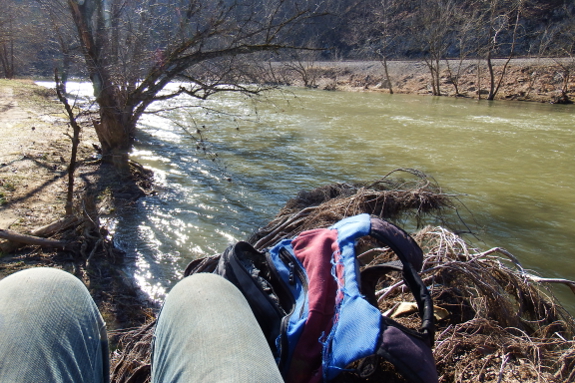
The forecast said Sunday
was going to be the last beautiful day for quite a while. So I packed a
lunch and a camera and took to the woods.
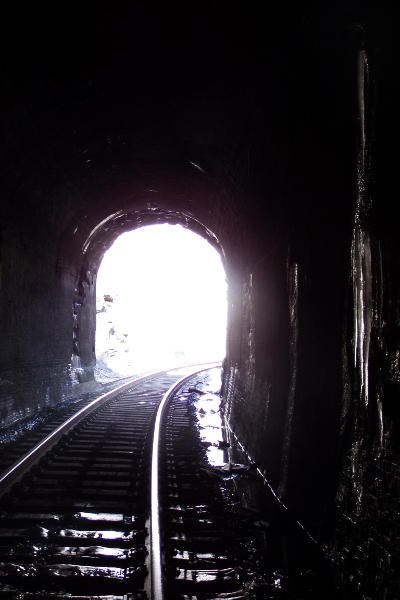 The
explorer in me likes new trails...but I detest driving long distances
in order to hike. So I ended up back at our old stomping grounds --- Sugar Hill in St. Paul.
The
explorer in me likes new trails...but I detest driving long distances
in order to hike. So I ended up back at our old stomping grounds --- Sugar Hill in St. Paul.
Luckily, nature had
changed the face of the riverside trail since Mark and I last walked it,
so there was plenty to explore. Most striking was a tremendous rootball
uprooted by a fallen sycamore at the river's edge. I couldn't resist
clambering to the top and perching fifteen feet above the ground while
listening to the swollen river rush past.
After sunning for a while, then walking another mile to St. Paul falls,
I decided to bushwhack back to the parking lot. On the way, I was
treated to several shows of cliffside seeps plus icicles in a railroad
tunnel. A fun adventure for a sunny Sunday!
This battery
disconnect switch is about a year old.
It turned out to be a great
solution to our battery draining issue and the brass terminal is
showing no signs of corrosion.
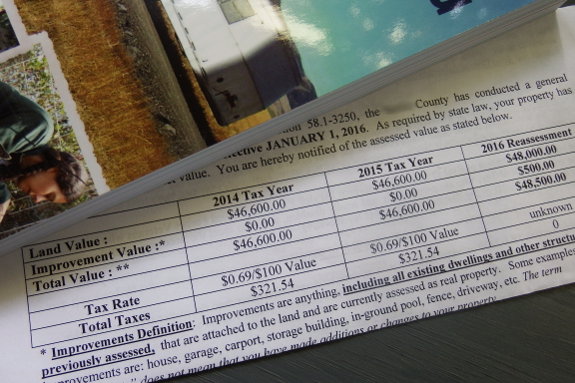
I think property taxes
are one of the most-overlooked items that should be considered before
buying new land. I read all the time about homesteaders who settle in
wealthy areas and end up paying a thousand bucks or more per month in
property taxes. If quitting your job is on your homesteading agenda,
that kind of tax burden will make it exceedingly difficult to simplify
your life enough to become self-sufficient financially.
I have to admit I didn't
think about property taxes when I bought our land either. Luckily, I
couldn't afford much, and ugly-duckling properties with junked singlewides
on them command very little value on the open market. Which is a good
thing! It means that even after our most recent tax reassessment, our
property taxes are likely to stay below $35 per month. Now that's a tax
burden we can afford.
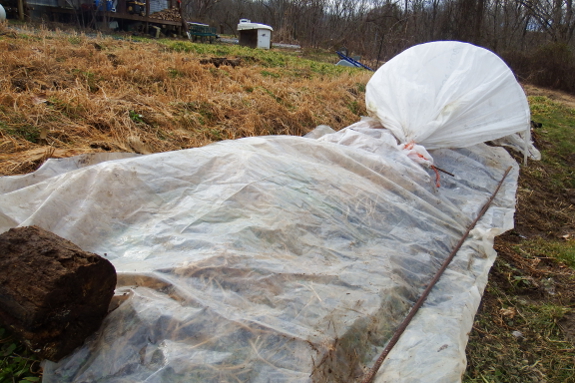
During a warm winter,
I'll start lettuce under quick hoops on February first and peas in the
open on Valentine's Day. During a frigid winter like last year, I might
not get anything out into the ground until the middle of March.
This year will likely fall somewhere in between with the determining factor being how 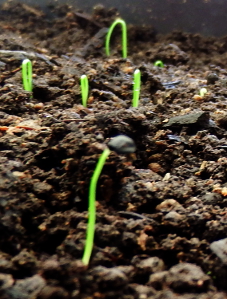 much this week's cold snap chills the soil. I'm looking for soil temperatures that are at least 40 degrees Fahrenheit first thing in the morning to prevent seedlings from rotting in the ground. And to that end I'm preheating my pea/lettuce bed in three different ways.
much this week's cold snap chills the soil. I'm looking for soil temperatures that are at least 40 degrees Fahrenheit first thing in the morning to prevent seedlings from rotting in the ground. And to that end I'm preheating my pea/lettuce bed in three different ways.
Treatment one, in the foreground above, includes some solarization
plastic from last summer weighed down with this and that. Treatment
two, in the middle-ground, consists of solarization plastic under a
quick hoop. And treatment three is the quick hoop alone. I'll check soil
temperatures in a couple of weeks and see which, if any, area hit that
critical 40-degree mark.
In the meantime, I'm starting more and more seeds inside.
My first onion seedlings are already up, and I plan to play with
broccoli and peas in soil blocks today. Maybe when the outdoor garden is
warm enough, I'll have some starts ready to go and will end up with a
harvest just as early as during warm winters in the past. Only time will
tell.
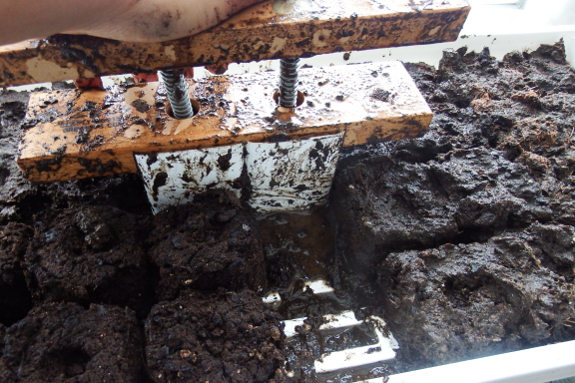
What's a gardener to do when on a bitter February day? Plant seeds, of course!
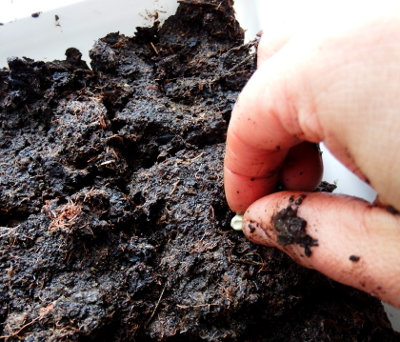 I
ran out of storebought potting soil to mix with my stump dirt, so I'm
trying a flat straight and hoping the cubes hold together. Worst-case
scenario, the soil cubes disintegrate
and fuse into a flat of intermingled roots. Since I'm sprouting pea
seeds with the hope of getting seedlings out in the garden in two weeks
or less, that shouldn't be too much of a problem.
I
ran out of storebought potting soil to mix with my stump dirt, so I'm
trying a flat straight and hoping the cubes hold together. Worst-case
scenario, the soil cubes disintegrate
and fuse into a flat of intermingled roots. Since I'm sprouting pea
seeds with the hope of getting seedlings out in the garden in two weeks
or less, that shouldn't be too much of a problem.
The real issue is that, ever time a flat germinates and comes off the heating mats,
I think of something else to fill a new tray with. Why not start some
kale seeds to replace the plants that are pretty much dead in the garden
for very early greens? And maybe some extra-early broccoli to set out
under quick hoops? I'm going to run out of space fast at this rate....
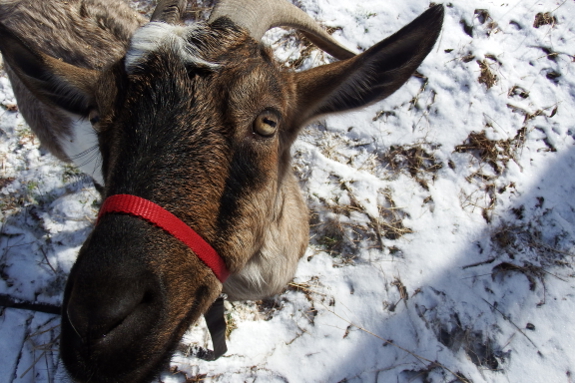
 Mark's in school today, which means you're supposed to not get an evening post. But I couldn't resist sharing this link to a piece I recently wrote for Mother Earth News about using a wood stove.
Mark's in school today, which means you're supposed to not get an evening post. But I couldn't resist sharing this link to a piece I recently wrote for Mother Earth News about using a wood stove.
I'd be curious to hear what those of you well-versed in wood heat would
add to the list. You can comment here, of course, but I'd love to see a
few comments on the Mother Earth News post itself. Maybe if it gets
enough traffic, they'll put it in the print magazine!
(And, no, the photo of Abigail has nothing to do with wood heat. But doesn't she look sweet against the snow?)
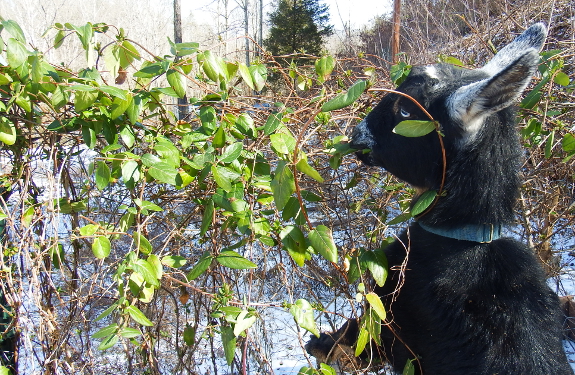
It seems like sacrilege
to have such a cute, adorable goat and to waste a whole post looking at
her hind end. So here's a starter photo of Artemesia cleaning up a
fenceline for me. And now, on to the butts....
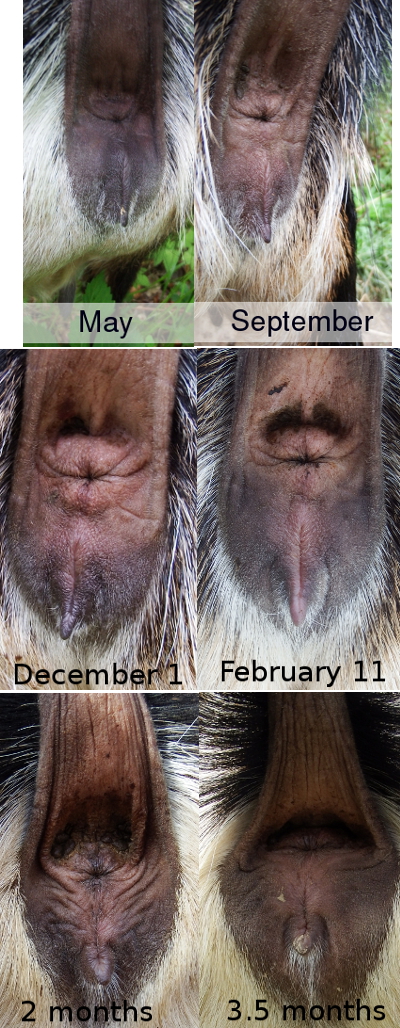 During Abigail's pregnancy last year, I tried a lot of home tests to figure out if she was pregnant. The only one that seemed at all diagnostic was peering at her vulva at intervals.
The bottom photo in this series shows the marked change that occurred
in Abigail's butt geography as she moved from her second to her fourth
month of pregnancy. Notice how the wrinkles fled as the vulva widened in
preparation for pushing a kid out a very small hole.
During Abigail's pregnancy last year, I tried a lot of home tests to figure out if she was pregnant. The only one that seemed at all diagnostic was peering at her vulva at intervals.
The bottom photo in this series shows the marked change that occurred
in Abigail's butt geography as she moved from her second to her fourth
month of pregnancy. Notice how the wrinkles fled as the vulva widened in
preparation for pushing a kid out a very small hole.
Looks diagnostic, right?
Now peer at the first pair of photos to the right. Those pictures were
taken in 2015 when I thought Artemesia might have been pregnant with
Abigail's grandchild. The obvious change, though, turned out to be due
to some combination of Artemesia maturing into her full sexuality (her
first birthday was in June) and perhaps changes to her vulva as she went
into heat. She wasn't pregnant after all.
Okay, now look at the
middle photos. These are the ones I'm currently scratching my head over.
We hope Artemesia is 2.5 months into her first pregnancy, assuming her post-Thanksgiving driveway date
stuck. As a certified nervous nellie, I change my mind about whether
Monte did the job every time our mini-Nubian (a cheerful, chatty girl)
calls a hello to me from her pasture or wags her tail in greeting when I
bring her breakfast. I haven't seen any mucous on her vulva since
D-day, but wagging and talking can both be signs of heat...which would
mean our first freshener hadn't freshened after all. And since we put
all of our eggs (milk bottles?) in one basket this year, that would mean
no homegrown dairy products in 2016.
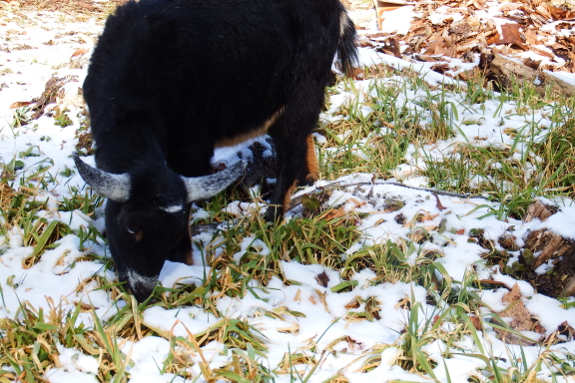
Unfortunately, based on
this series of butt shots, I have to conclude that I can't actually
conclude anything for another month. A trip to the vet to utilize his
ultrasound looks better and better, but I'll probably keep biting my
fingernails and tough it out. After all, if we really wanted a summer
kidding, the difference between a July and an August birth wouldn't be
that great. Maybe I shouldn't have named Artemesia's hypothetical unborn
daughter Aurora after all?
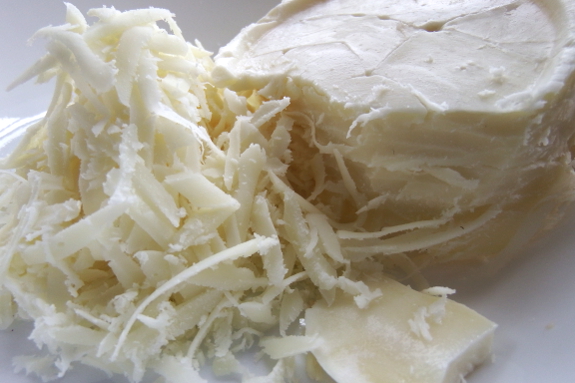
While we dream about Artemesia's possible kids (and future milking habits), I'm slowly thawing out some of the cheese from Abigail's 2015 excess. The ricotta that I wasn't so sure would be interesting was quite a hit within a chicken parmesan recipe. And her mozzarella
melts beautifully on top of homemade tomato soup. Thank you, Abigail!
It's wonderful to have a little summer to brighten this winter day.
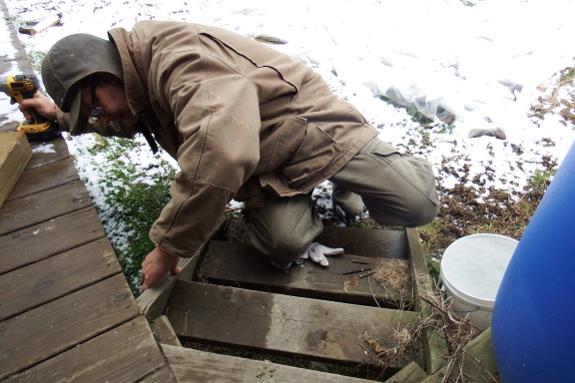
I added a piece of lumber under each side of the step as a brace. Hopefully that fix will last another third of a decade.
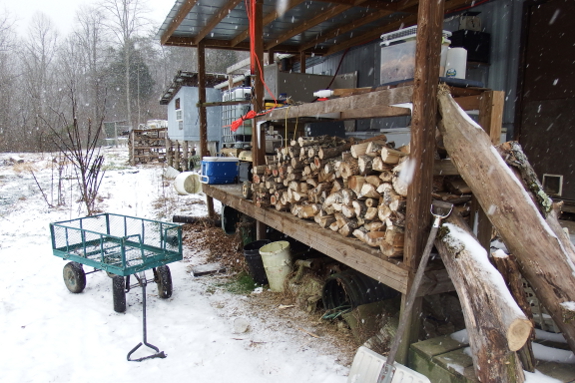
Assuming spring comes at
least close to on schedule, it looks like this will be the first year
ever when we didn't have to ration firewood toward the end of the
winter. In fact, we're still burning wood marked for January and will
likely continue to do so for another week. In other words --- there's
quite a bit more fuel waiting in the shed.
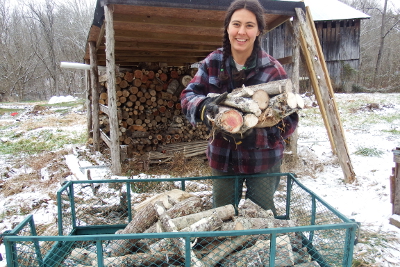 One
of my original plans for this winter was to build another woodshed so
we could sock away the next year's firewood while burning the previous
year's stores, allowing us to get a full twelve-plus month drying period
in. But we've only been filling our shed about halfway
full in the past, meaning we could actually keep two years' worth of
wood under our existing roof if we rearranged the opening. So our new
plan is to block off the current open side and open up one of the long
sides, then divide the shed in two. Hopefully the result will be two
stacking areas with very little extra expenditure of materials.
One
of my original plans for this winter was to build another woodshed so
we could sock away the next year's firewood while burning the previous
year's stores, allowing us to get a full twelve-plus month drying period
in. But we've only been filling our shed about halfway
full in the past, meaning we could actually keep two years' worth of
wood under our existing roof if we rearranged the opening. So our new
plan is to block off the current open side and open up one of the long
sides, then divide the shed in two. Hopefully the result will be two
stacking areas with very little extra expenditure of materials.
The only downside? We
need to entirely empty this shed out before we can start refilling it
since we'll be stacking wood in the opposite direction. Better start
moving that extra wood to the back porch so we can clear our canvas and
start reinvisioning our new shed.
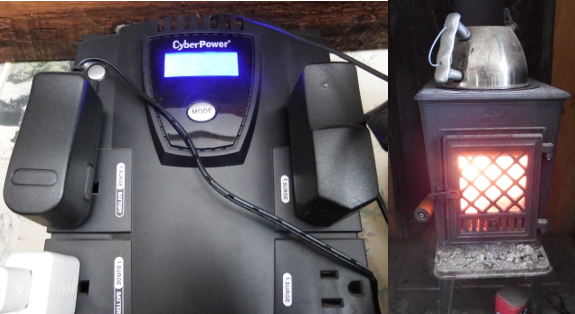
This is just a quick note
to let you know our power's out. So, family and friends, if I don't
answer your email or we don't post on schedule, please don't assume we
got eaten by bears. We're hunkered down in front of the fire, hoarding
our 79 minutes of backup power for when we really need them and
feeling lucky that lack of electricity doesn't cause any dramatic
problems for us any more. I hope you're all staying warm!
The new plan to make our convertible kitchen counter easy to remove was to suspend it with chains that hook into an eye bolt.
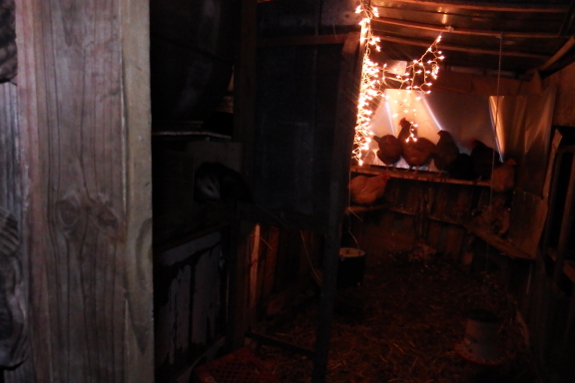
Anna: There's a opossum in the chicken coop! I need you to shoot it. Should I get the rifle?
Mark [perusing his half-clad wife]: First, you should put on some pants.
 When
we first moved to the farm, I wouldn't have dreamed of shooting a
opossum (or asking Mark to shoot one). But our closest neighbors are all
four-footed, and we soon realized that if we wanted to grow our own
food, we had to protect that food from the wilds. To that end, we now
hunt deer for our table and will occasionally kill varmints in the
chicken coop. Not snakes or hawks --- I figure those guys have a bad
reputation and need a bit of help. But a opossum or a raccoon who's
stealing eggs and might make a stab at a living bird? Those guys see no
mercy.
When
we first moved to the farm, I wouldn't have dreamed of shooting a
opossum (or asking Mark to shoot one). But our closest neighbors are all
four-footed, and we soon realized that if we wanted to grow our own
food, we had to protect that food from the wilds. To that end, we now
hunt deer for our table and will occasionally kill varmints in the
chicken coop. Not snakes or hawks --- I figure those guys have a bad
reputation and need a bit of help. But a opossum or a raccoon who's
stealing eggs and might make a stab at a living bird? Those guys see no
mercy.
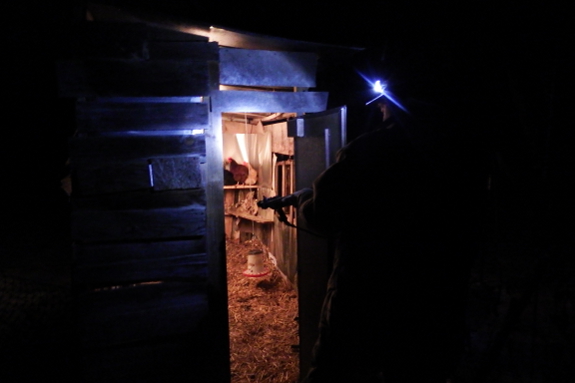
If it makes you feel any
better, I'm pretty sure this wasn't Mr. Opossum's first offense. I'd
seen signs of broken eggs in the nest box off and on over the last
couple of weeks. But I'd just assumed someone was laying thin-shelled
eggs. Wrong. Likely our egg predator had been snacking for quite a
while.
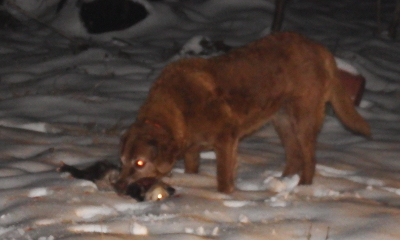 Lucy
used to be in charge of border patrol, and I remember seeing more than a
few opossum carcasses over the years. But as our hardy farm dog has
gotten older, Mark has taken over up-close-and-personal strikes
like this one. So, Monday night, my steady husband took a deep breath,
pulled the trigger, then we gave the carcass to Lucy to dispose of. With
me to run out when the hens cackle after dark, Mark to kill the beast,
and Lucy to eat what's left, we make a pretty good team.
Lucy
used to be in charge of border patrol, and I remember seeing more than a
few opossum carcasses over the years. But as our hardy farm dog has
gotten older, Mark has taken over up-close-and-personal strikes
like this one. So, Monday night, my steady husband took a deep breath,
pulled the trigger, then we gave the carcass to Lucy to dispose of. With
me to run out when the hens cackle after dark, Mark to kill the beast,
and Lucy to eat what's left, we make a pretty good team.

My editor sent me the first formatted pass of The Ultimate Guide to Soil
to look over this afternoon. The book still has to be line edited and
copy edited, but I'm very happy with the interior. Look --- pretty
shovel icons!
If you want a preview before the paperback goes live, the first quarter is already available in ebook format and the second quarter is up for preorder (launching March 8). Part three will go up for preorder early next month, so stay tuned....
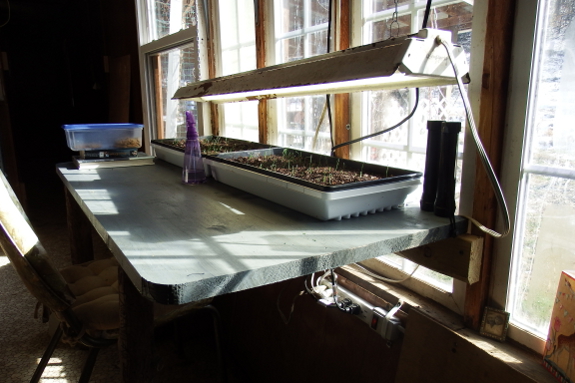
In every part of gardening, there are inevitably setbacks when you try something new. My fancy seed-starting setup
started off great, producing healthy onion seedlings and quickly
sprouting lettuce and kale seeds. But the peas refused to come up. And
when I poked in the dirt atop the latter, I discovered that every single
seed had rotted in the ground.
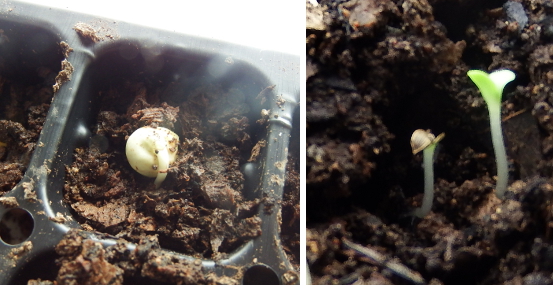
Putting on my thinking
cap, I came up with three potential problems. Possibility one --- peas
hate stump dirt. Possibility two --- the year-old pea seeds just weren't
viable. Or --- the possibility I suspected was actually the most
relevant --- our new heating mats exceeded the maximum germination temperature for these cold-weather legumes.
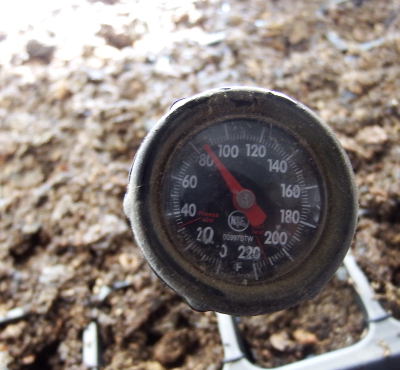 The trouble was, I bought a cheap seed mat without a thermostat,
and I soon found that the device runs a little hotter than the heating
pad I'd been using previously. On a warm day with the heating mat on,
soil temperature was right at 85, compared to a non-heated tray that
clocked in closer to 72. Sure enough, 85 is listed as the maximum
germination temperature for peas.
The trouble was, I bought a cheap seed mat without a thermostat,
and I soon found that the device runs a little hotter than the heating
pad I'd been using previously. On a warm day with the heating mat on,
soil temperature was right at 85, compared to a non-heated tray that
clocked in closer to 72. Sure enough, 85 is listed as the maximum
germination temperature for peas.
To test this hypothesis, I
started another round of pea seeds, this time off the heating mat but
using seeds from the same packet planted in the same stump dirt. Sure
enough, three days later, this second round of peas had broken dormancy
and were sending down roots. Success!
Moral of the story: keep
peas off the heating mat but put everything else on the heating mat
until they sprout. I'm curious to see what my new setup teaches me next.
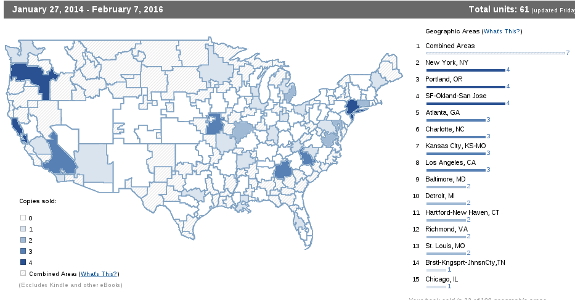
 One
of my favorite things about print books is waiting to see where they
pop up in the wild. Recently, one of my readers emailed to say he'd seen
The Naturally Bug-Free Garden at Longwood, and it made my day a couple of years ago when I spotted The Weekend Homesteader hiding amid other self-sufficiency books at an event in South Carolina.
One
of my favorite things about print books is waiting to see where they
pop up in the wild. Recently, one of my readers emailed to say he'd seen
The Naturally Bug-Free Garden at Longwood, and it made my day a couple of years ago when I spotted The Weekend Homesteader hiding amid other self-sufficiency books at an event in South Carolina.
Now Trailersteading
has had two full weeks to hit shelves in bookstores and libraries,
homes and Tractor Supply. I'm hoping you'll go on the hunt to find it!
It's simple to enter the scavenger-hunt giveaway. Just snap a shot of my
newest paperback in the wild (preferably with you in the picture), then
post it somewhere online and copy the link into the comments section
below. Alternatively, you can email me
the photo to share here. Either way, be sure to check back on March 1
when I'll pick a winner to be gifted with a signed paperback edition of
the book in question. May the hunt begin!
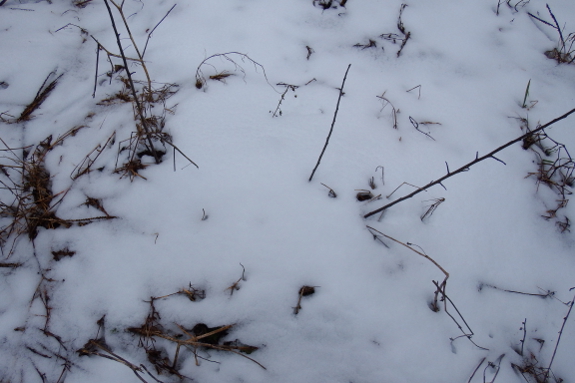
I dug into my stooled rootstocks
this week to see if I had any cuttings to turn into new trees. I could
tell you lots of reasons why this was the right time to take a look
inside the mound. But the truth is that our earth had been snow-covered
for quite a while and I was antsy to get my fingers into the dirt.
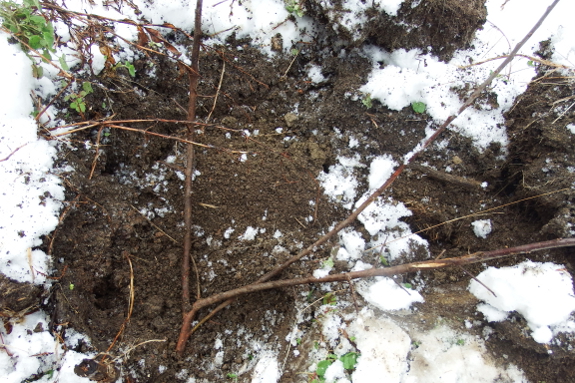
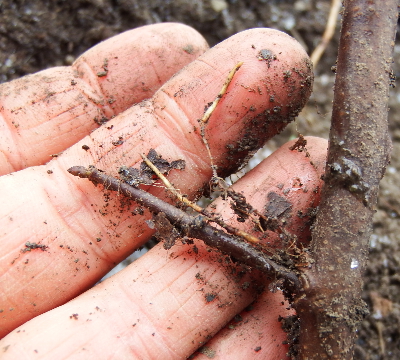 Rootstock
mound #1 looked good from the outside. I'd hilled up the dirt pretty
high, and there were three good shoots sticking out the top. But when I
broke through the frozen ground to reach the interior, all I found was
one little cluster of roots --- not enough to keep the plant alive if I
severed it from the base.
Rootstock
mound #1 looked good from the outside. I'd hilled up the dirt pretty
high, and there were three good shoots sticking out the top. But when I
broke through the frozen ground to reach the interior, all I found was
one little cluster of roots --- not enough to keep the plant alive if I
severed it from the base.
For those of you keeping
track at home, this is a M26 rootstock leftover from a winter-top-killed
tree planted a little over three years ago. I figured since the
rootstock was still sprouting despite the loss of the scionwood, I'd
turn the plant into a stool and use it to produce rootstock for the
future. And that may still work --- we'll see how the interior looks in
spring 2017. In the meantime, I covered the shoots back up and moved to
the next stool along the line.
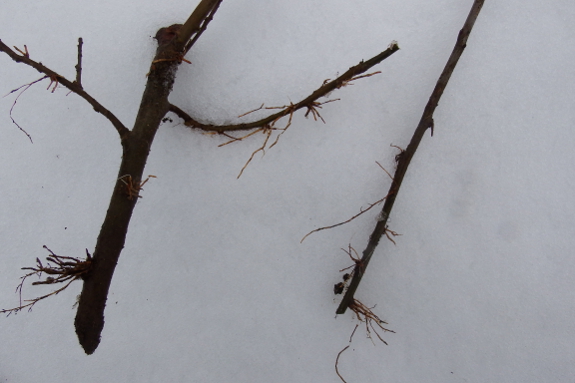
Mound #2 is younger, but
is also a different variety. I bought an extra MM111 rootstock a little
less than two years ago specifically for rootstock reproduction. As with
the accidental rootstock, I cut back the primary shoot last spring,
then mounded up around the new branches
all through the summer. Digging into the stool now, I found two
passable rootstocks ready to be harvested for spring grafting. Success!
We decided to add another
shop light to our new
seed growing station.
This new one is LED. It was
35 dollars at Lowes and should last longer while using less juice
compared to fluorescent.

While planning out our own garden year, it's also time to take stock of how our goat-fodder garden worked out over the last twelve months. You can see my number-crunching preparatory post here, and this is what we actually planted for our two spoiled darlings:
| Crop |
Square footage for goats |
Conclusions |
| Butternut Squash |
135 |
We'll probably run out in early
March. This is the goat favorite and the seeds are natural dewormers, so
I'm glad I grew far more than I planned to! |
| Carrots |
60 |
We ran out in January --- not bad
since I planned on feeding concentrates to a single goat and ended up
feeding two. (I'm currently feeding Abigail to help her regain weight
after drying off and Artemesia to keep on her weight since she's hopefully pregnant.) |
| Mangels |
15 |
Our goats didn't really eat these
without lots of begging and pleading, so I composted most of the fodder
beets and won't grow them again. |
| Sweet potatoes |
45 |
I planted these in a bad spot and
didn't get a high yield. We've mostly been saving the crop for human
consumption since they're one of Mom's favorites, but our goats like
what I've given them too. |
| Sunflowers |
75 |
For some reason, almost none of
my sunflowers came up in 2015. I know from past experience that our
goats love them, though, so I'll do better next year. |
| Field corn |
60 |
I grew this mostly for
leaf-matter production since I'm dubious about feeding grain to
ruminants. The goats loved eating the corn when I let them have it, but
they refused field-corn stalks and leaves in favor of sweet-corn stalks
and leaves. I won't grow field corn again for our spoiled darlings. |
| Sorghum |
15 |
Our goats love sorghum stalks and
leaves and the plants are easy to grow...but I got spooked when I
realized the food could potentially poison our girls if eaten after a
drought or freeze. Nothing bad happened, but I'm on the fence about
growing it again. |
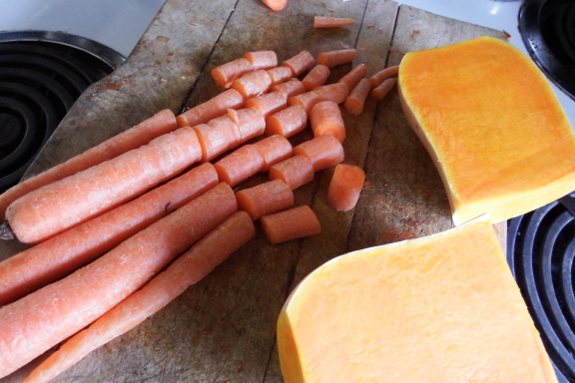
So, focusing just on goat-approved crops that did well for us, a plan for one goat might consist of:
| Crop |
Square footage for goats |
| Butternut Squash |
80 |
| Carrots |
45 |
| Sweet potatoes |
45 |
| Sunflowers |
75 |
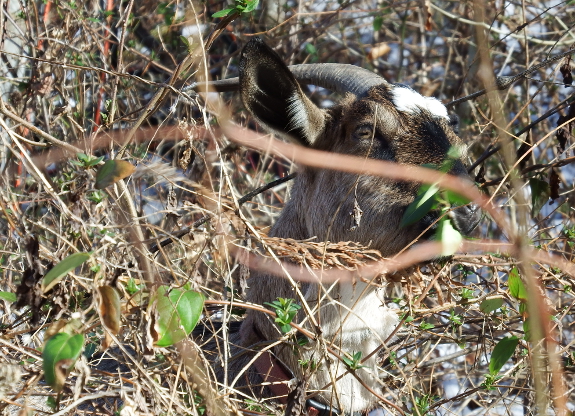
Of course, that's just
concentrates above and beyond the hay/wild-grazing ration. In addition,
I'll admit that we also feed our goats about a pint apiece of alfalfa
pellets per day and we splurge on fancy kelp for minerals too. But the
plan above is a good start on a healthy goat diet that will keep total
feed costs for a herd of two goats about even with the cost for a flock
of ten chickens --- not bad.
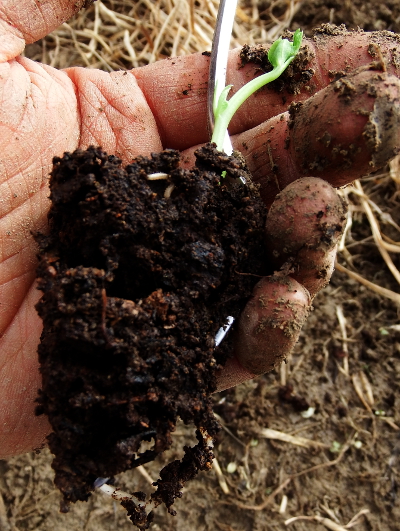 The sun was shining, the snow was melting, the soil was warming...and I went a little nutty planting things.
The sun was shining, the snow was melting, the soil was warming...and I went a little nutty planting things.
I'll start with the least nutty part --- transplanting week-old pea seedlings.
I've never tried starting peas inside before, and from various
anecdotes on the internet it sounds like it's best to set them out as
early as possible. Originally, I'd planned on keeping them inside for
two weeks, but at a mere seven days the tap roots were already butting
up against the bottom of the container. So I set the seedlings out
inside a quick hoop where I'd used both plastic and row-cover fabric to preheat the soil. (In case you're curious, the combination gave me about a three-degree bonus over either layer alone.)
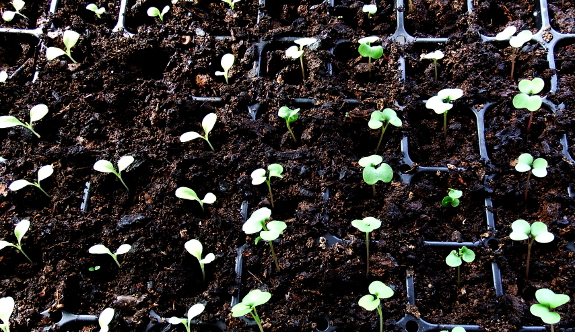
Moving down the line to
slightly nuttier behavior, I next set out a flat of week-old baby kale
and lettuce that was mostly still at the cotyledon stage. I wouldn't
have even considered this if I wasn't able to put the seedlings directly
under quick hoops and to promise them a one-week grace period before
winter returns. Still, the babies looked awfully tender out there in the
winter dirt, and I'm not so sure they'll make it.
To hedge my bets, I set
them out in three locations --- in the back garden where I'd been
preheating soil for a while but where the ground was soggy wet, in the
mule garden where I hadn't been preheating but where the sun had been
shining hard on moist ground, and up against the west face of the
trailer where the ground was actually a little too dry due to resting
under the eaves. (I watered that last area lightly after planting.) Even
if most of the crop fails, the experiment will be handy for pinpointing
which zones are best for really pushing the spring envelope, so the
seedlings' sacrifices won't have been in vain.
Speaking of pushing the
spring envelope, I concluded my Friday craziness by moving a quick hoop
off barely alive kale and onto dormant Galleta strawberries.
The Galletas are already supposed to be an ultra-early variety, so I'm
hopeful that a little soil preheating will net us homegrown fruit in
early May...or maybe we'll just end up with early, frost-nipped blooms
despite the row-cover fabric. Only time will tell.
(I know I didn't take
enough photos to match the words in this post. Did I mention I was a
little sun-crazed?! I'll do better next time.)
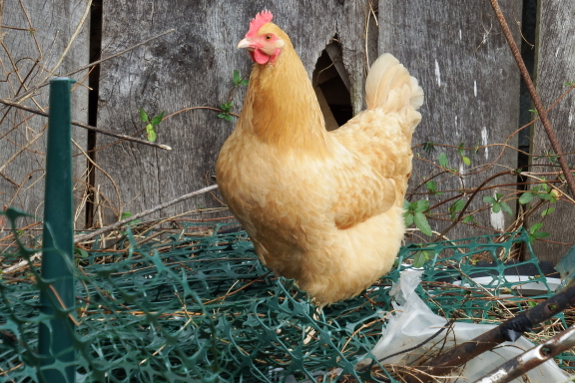
The warm weather has made our
Maverick hen brave.
The chicken tractor is full
which means we might
have to choose between building a bigger chicken tractor and early
retirement.
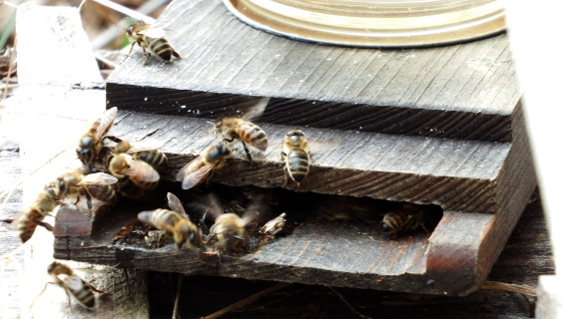
As we near the end of our first decade homesteading, I'm slowly but surely realizing that there is no free lunch on a farm. Seed balls look pretty but produce few surviving plants,
the dream of an entirely self-sufficient chicken is (for most of us)
only a dream, and you have to feed bees if you want them to feed you.
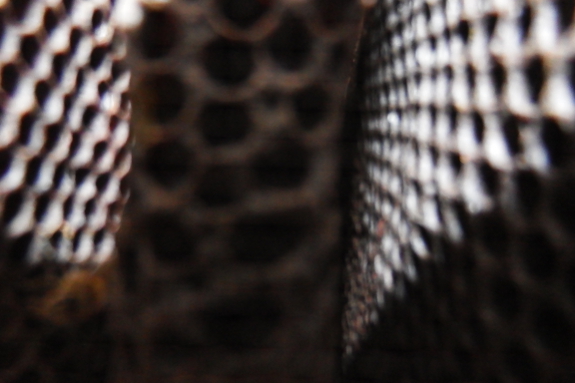
Natural
beekeeping suggests that you should only feed your hive in the fall if
they otherwise wouldn't have enough stores to make it through the
winter. Using that methodology, I've finally learned to keep healthy bees...but not to harvest honey.
Maybe if we lived in a
much warmer climate where bees can fly and flowers bloom copiously for
nine months out of the year, our hive would make excess stores with no
sugar-water pick-me-up. But here, where we only enjoy five months
between first and last frost, I suspect spring feeding is mandatory to
get hives bulked up enough that they can harvest sufficient wild nectar
to feed both us and them.
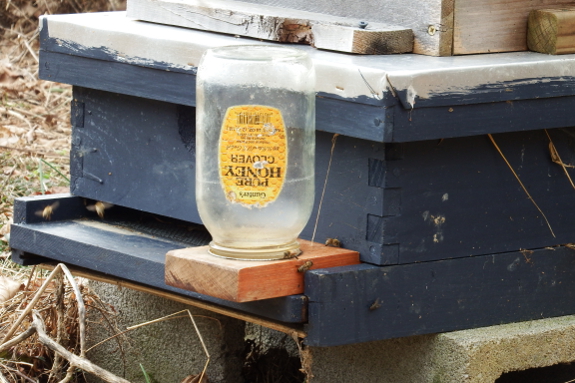
To that end, we're taking advantage of some warm days to feed the bees. This hybrid hive
ate a pint in an afternoon, proving that their populations are high and
that I need to add another box if I don't want early bulking up to turn
into a swarm
like last year's. The Warre hive, in contrast, only sipped daintily at
their feeder, suggesting their numbers are low enough that they might
not even have survived without the bonus feeding.
I'm slowly working my way
toward a compromise between the high-impact, chemically treated bees
that produce all the honey you can buy in stores and the entirely
naturally raised bees that survive well but don't produce much at all.
The end result might be Langstroth hives fed early to bulk up their
numbers then managed with low-impact Warre methodology. Only time will
tell....
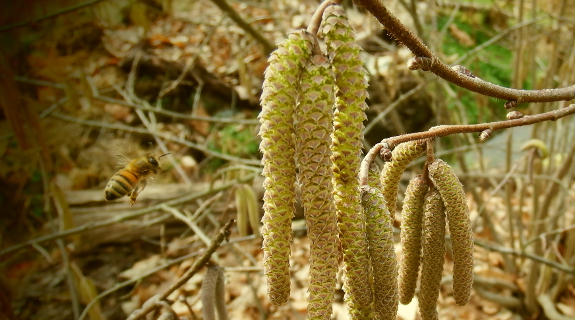
I'm not the only one going a little crazy in this late February warm spell. The bees are so busy gathering hazel pollen that our whole bush literally buzzes, and the wild birds are belting out their spring songs at peak pitch.
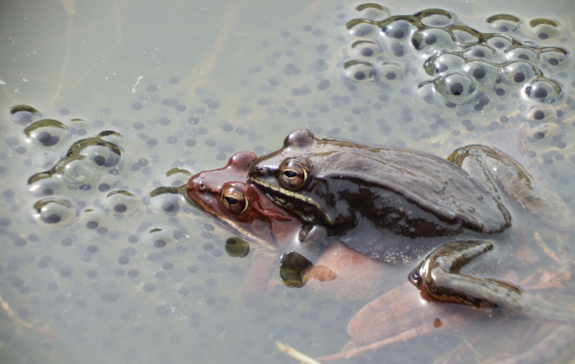
The frogs are even louder
though. Between the chorus frogs and the wood frogs, the calls are
almost deafening during warm, rainy nights. Puddles are full of masses
of eggs and I startle mating amphibians every time I walk past. Some
folks would call this mud season, but I prefer to focus on the frogs.
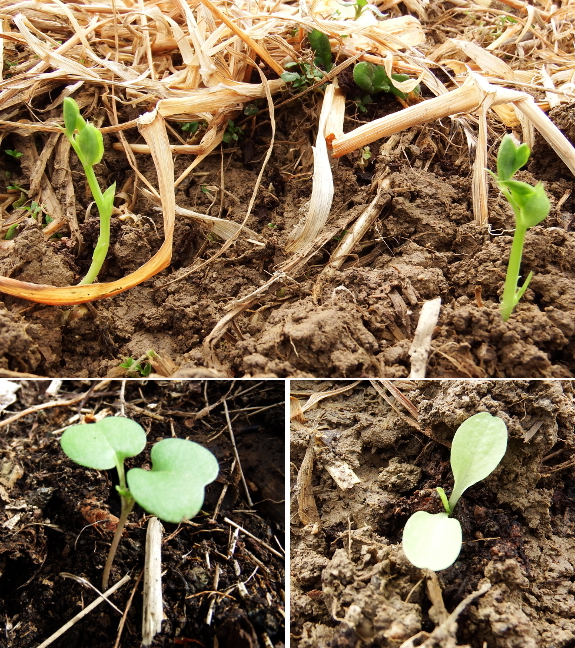
I promised you some more baby pictures from my Friday planting,
and I also wanted to see for myself if I'd been nuts to set out
week-old seedlings. So I poked back under the quick hoops and row covers
three days later...and discovered that everyone was not only holding
steady but also putting out new growth! I'm sure it didn't hurt that it
was warm and rainy during the intervening period, so both top and root
shock was minimized. We'll see how well the babies do when the weather
turns cool later in the week.
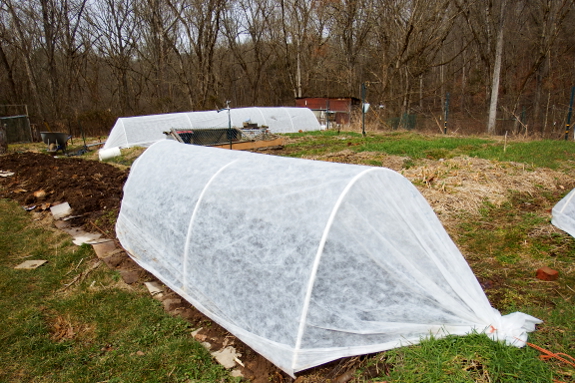
Some of those babies are
under the quick hoop closest to the camera. This spot is new ground
created in the last six weeks by broadforking sod, laying down a
one-thickness layer of corrugated cardboard, then shoveling good garden
soil on top from beds that were in a shady spot and thus weren't
providing peak vegetable growth despite high soil quality. I go into
this sort of no-till practice in much more depth in my upcoming soil
ebook Small-Scale No-Till Gardening Basics, so be sure to preorder a copy or mark your calendar for March 8 if you're interested!
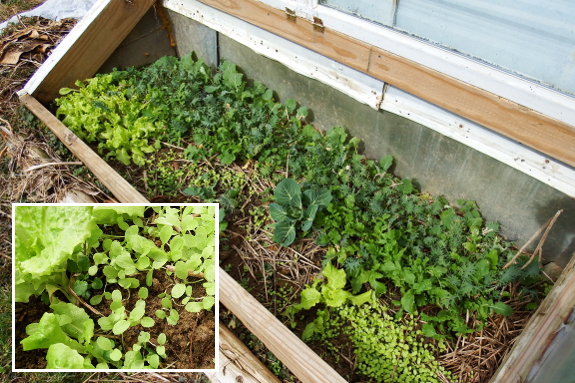
Closer to home, the cold frame
is still plugging along. We've been harvesting one small salad's worth
of lettuce and/or greens per week from this area all through the coldest
parts of winter. I consider that proof positive that soil temperature,
not day length, is what keeps greens from producing in the dead of
winter.
How's your winter garden growing?
I forgot to mention some
details about our new LED shop
light.
The company is called
Utilitech. It's 4ft long with no chain pull switch.
Total cost was 35 after Lowes
Military discount.
Our baby onion sets are
thriving under its glow.
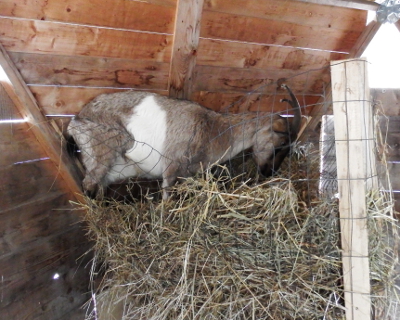 So, the reason behind our most recent manger renovation
is that Abby skinned her knee and I freaked out. A skinned knee on a
goat just looks really scary! Our poor doe had torn all of the hair and
hide away from a one-inch-diameter circle on her front leg, and I
thought the world was coming to an end.
So, the reason behind our most recent manger renovation
is that Abby skinned her knee and I freaked out. A skinned knee on a
goat just looks really scary! Our poor doe had torn all of the hair and
hide away from a one-inch-diameter circle on her front leg, and I
thought the world was coming to an end.
I doctored her up with
hydrogen peroxide and homemade comfrey salve, then rushed inside to ask
those near and dear to me for a dose of perspective. "Was there blood?"
Kayla asked over the phone.
"Well, no," I answered.
Gently, Kayla told me how the first time her nephew skinned his knee on her watch, she'd cried real tears of anguish. "Did he cry?" I asked.
"Well, no," Kayla answered.
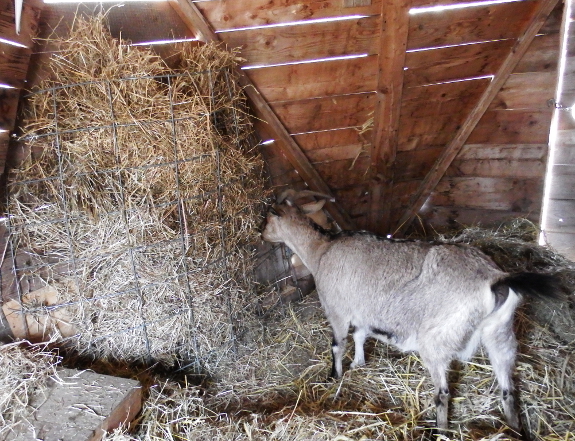
Now, I'm not going to
tell you that Abigail's woes were as simple as a human skinned knee. But
in the ensuing days she hasn't had trouble doing the important things
in life --- eating, drinking, sleeping, and head butting her herd mate.
And even though there's some swelling, there's no sign of heat when I
cup her leg both above and below the wound. So I think she's going to be
fine.
Still, the manger --- the
source of the skinned knee --- had to go. Luckily, Abigail likes the
replacement apparatus much better. The bigger holes and higher
surface-to-volume ratio makes it easy to pick out her favorite strands
of hay...and drop everything else on the floor. I know this almost certainly gives a blog buddy fits,
but spoiled goats seem to need to spoil hay. Maybe one of these days
we'll grow our own top-notch feed and then our goats won't be so
persnickety.
In the meantime, I'll continue to give Abigail everything she wants for
fear of her skinning another knee. After all, a contented goat stays on
the ground...
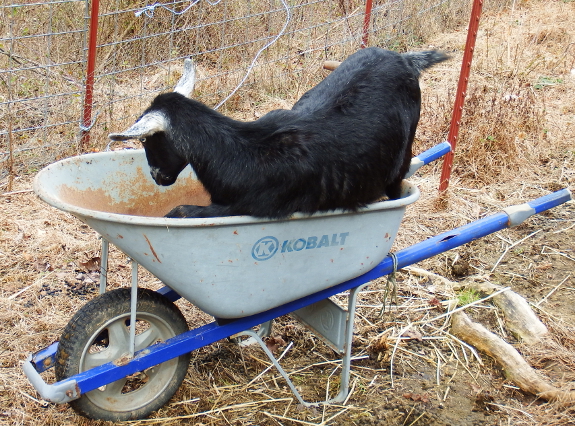
...sometimes.
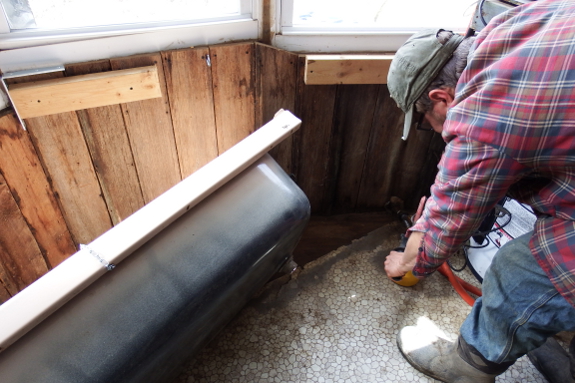
One of the joys of living is a trailer is how very malleable our abode is. Want to cut a hole in the floor for folding-bathtub drainage? No worries --- just pull out the hole saw and 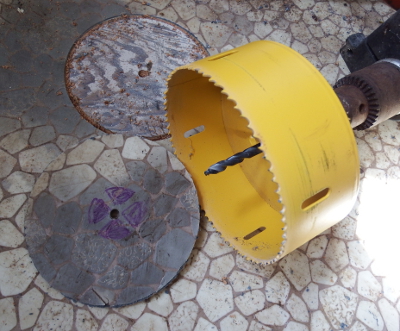 whack on through.
whack on through.
A layer of linoleum,
a layer of subflooring, and a thin layer of particleboard that holds
our supposed floor insulation in place later and we had an opening to
the outside.
The next step was to push a corrugated black plastic pipe up through the hole, then attach the other end to the back of our below-the-sink drainage system. Instant access to the graywater wetland!
I've already enjoyed the
wonders of our folding bathtub in action, but you'll have to wait for
another post to see it in place. I know --- I'm such a tease!
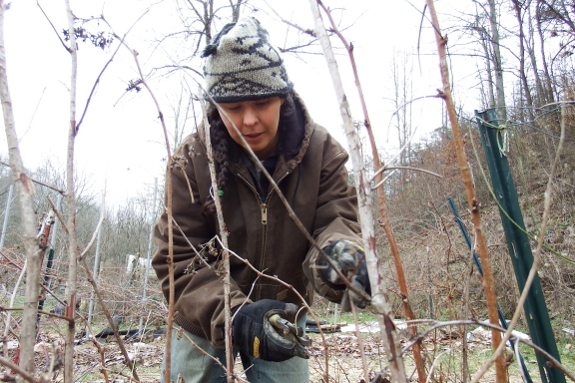
It's been rainy and gray
for most of the week, which has kept my gardening to a minimum. There's
not too much to do in the outside garden at this time of year, but I do
have a few projects on the back burner --- notably extending my new mule garden bed, spreading compost and chicken bedding on various parts of the spring-garden-to-be, and pruning the berries.
I've actually been
holding off on pruning since I've felt like midwinter pruning has
prompted winterkilling during subsequent frigid spells during previous
years. But maybe if I steer clear of the kiwis for a while, I can get
away with a bit of cleanup. After all, it is almost March and these raspberry canes will start breaking dormancy in a few short weeks!
It took less than a day for
the girls to push the single tire
on a slant.
I think the best thing to do
is to merge the single tire with the others.
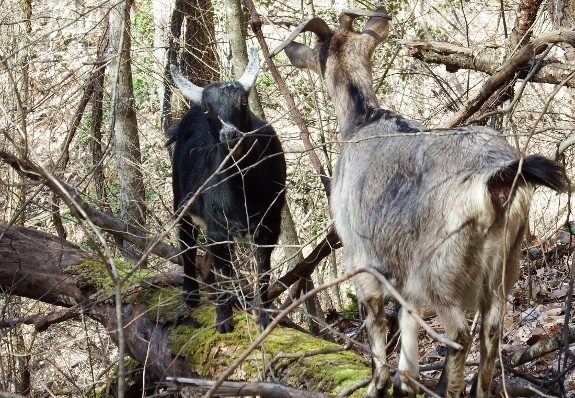
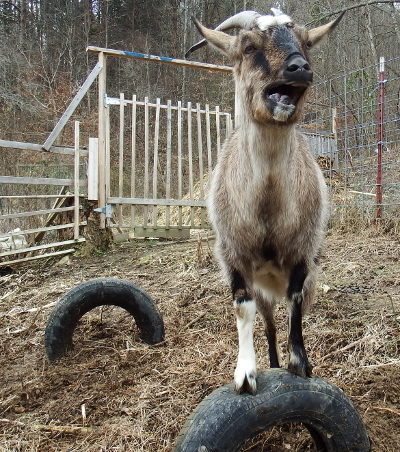 With a little less than two months to go until Artemesia's hypothetical B-day...
With a little less than two months to go until Artemesia's hypothetical B-day...
Abigail [interrupting]: Is this going to be another one of those goat-butt-collage posts? Because, if so, I'm outa here.
Anna [hastily closing the goat-butt collage she was building in the Gimp]: No, of course not, Abigail. Go stand on your tire.
Ahem, anyway, before I was so rudely interrupted....
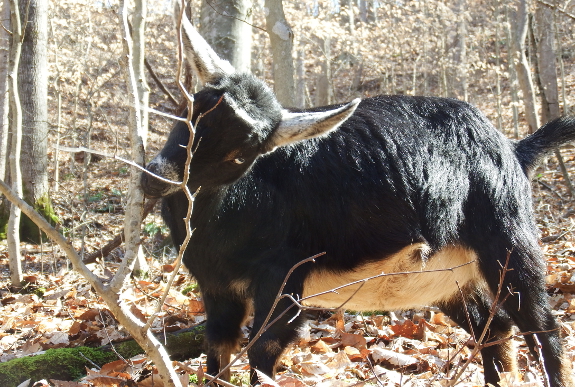
Artemesia has grown very
rotund lately, but I'm 99% sure that most or all of that mass is hay.
After all, on days when Abigail (using her herd-queen prerogative)
declares that all goats are going to stand out in the rain rather than
eating at their nice dry manger, our first freshener looks quite a bit
skinnier.
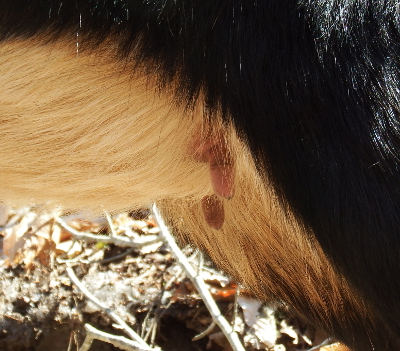 That
said, there are some small signs that give me hope our little doeling
has a bun in the oven. This past week, I've felt like her teats are
becoming subtly more noticeable --- they used to be tiny little things I
couldn't even imagine squeezing milk out of, and now they're a bit more
prominant. Possible sign #2: at hoof-trimming time, Artie's hooves
hadn't grown much at all despite all of the concentrates we're feeding
her (and the rather impressive amounts of hay she gorges on), suggesting
that she's putting those calories to good use elsewhere. And possible
sign #3: her chatty moods are even more frequent and are nowhere near on
a 21-day cycle, suggesting that pregnancy hormones (rather than heat
hormones) are at work.
That
said, there are some small signs that give me hope our little doeling
has a bun in the oven. This past week, I've felt like her teats are
becoming subtly more noticeable --- they used to be tiny little things I
couldn't even imagine squeezing milk out of, and now they're a bit more
prominant. Possible sign #2: at hoof-trimming time, Artie's hooves
hadn't grown much at all despite all of the concentrates we're feeding
her (and the rather impressive amounts of hay she gorges on), suggesting
that she's putting those calories to good use elsewhere. And possible
sign #3: her chatty moods are even more frequent and are nowhere near on
a 21-day cycle, suggesting that pregnancy hormones (rather than heat
hormones) are at work.
That said, the goat-butt
photos are as yet inconclusive. So we'll keep waiting and hoping that
Artemesia will pop out a kid (or, more likely, a pair of twins) around
April 24. Fingers crossed....
We decided to spend a little
extra money on a quality fan for the new
seed
flats.
The small, cheap fans I've
used in the past are loud, weak, and don't seem to last longer than a
few years.
The Vornado small air circulator is
solid and
quiet and nice to look at.
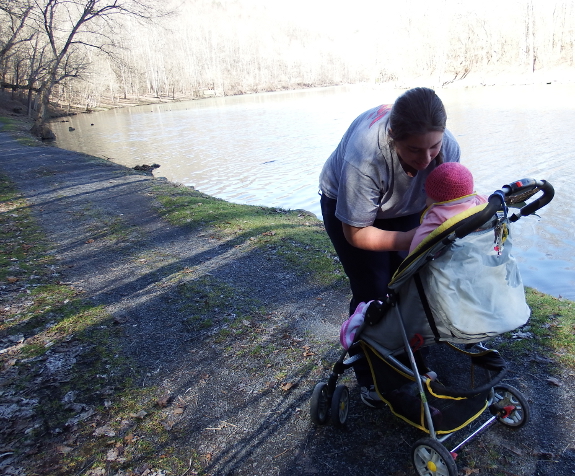
I haven't seen much of
Kayla lately since she and her husband are new foster-parents to a
five-month-old baby girl. For the sake of both biological parents and
baby, I can't show you any identifiable photos, nor can I use her name.
But Kayla and I and the UFB got together Sunday for a stroll and ice
cream --- a beautiful afternoon and a much-needed dose of girl time.
Thank you, Kayla, for taking time out of your new mothering
responsibilities to cheer me up!
We first
started tapping a Black Birch tree last year three weeks into March.
Today it only took a few minutes
for the dripping to begin once the spile was in.
Maybe we'll start in the
middle of February next year?
Want more in-depth information? Browse through our books.
Or explore more posts by date or by subject.
About us: Anna Hess and Mark Hamilton spent over a decade living self-sufficiently in the mountains of Virginia before moving north to start over from scratch in the foothills of Ohio. They've experimented with permaculture, no-till gardening, trailersteading, home-based microbusinesses and much more, writing about their adventures in both blogs and books.
